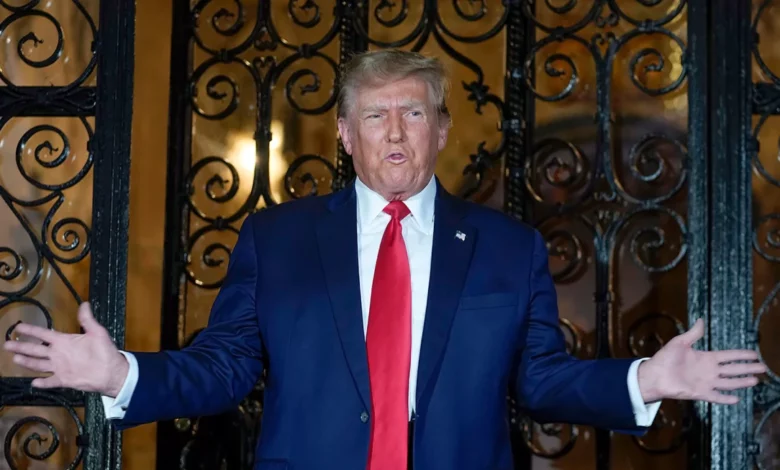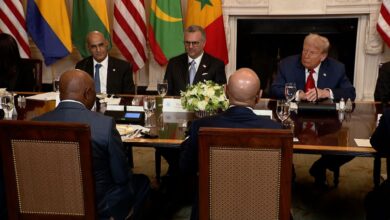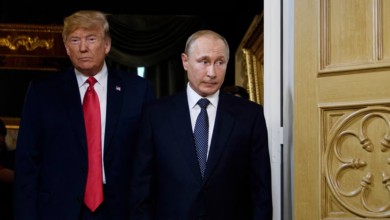
So his devastating loss Friday in a New York fraud case that threatens the empire on which he built his art of the deal mythology encapsulates more than a legal defeat.
It offers a character study of the behavior, beliefs and worldview that define the DNA of an irrepressible figure and unchained force who is again tearing at American unity, institutions, democracy and the rule of law as another contentious election looms.
A trial, which Trump tainted with histrionics and contempt for the judicial system, and Judge Arthur Engoron’s final, stinging judgment, revealed four foundational codes that explain Trump’s tumultuous path through a life that he simply sees as an endless stream of business and political deals he must close.
- Trump thinks rules are for other people. He will always break them in seeking more wealth, more attention, or more votes.
- If reality doesn’t get the ex-president what he wants, he conjures a new one.
- Trump is compelled always to fight — even when stepping back would be smarter.
- And when accountability finally arrives, he sees justice as an act of persecution by his enemies.
These Trump traits leap out of a staggering 92-page ruling handed down by Engoron, which left Trump facing a half-billion-dollar hole in his finances because of penalties and obligations in this and other cases.
The judge encapsulated the former president’s brazen refusal to play by the same rules under which everyone else must live — and that in this case are the key to a functioning banking and economic system — with the words: “ The frauds found here leap off the page and shock the conscience.”
But evidence never swayed Trump before and will not now, despite his crushing defeat. Whenever he loses, he just doubles down with a bigger falsehood — in this case that a fair legal process was simply a political attack by President Joe Biden.
“All comes out of the DOJ, it all comes out of Biden,” Trump said. “It’s a witch hunt against his political opponent, the likes of which our country has never seen.”
The climax of the case deepened the extraordinary legal morass facing Trump who is embroiled in multiple cases and faces the first of his criminal trials next month. The judgment portrays Trump, his adult sons and the Trump Organization, flouting business ethics, rules and laws to pull valuations for their property assets out of the air to get favorable loans, and then even more remarkably, refusing to accept the facts of their conduct when confronted with the evidence.
Practically, Engoron’s decision will impose severe financial and personal strain on Trump as he’s emerging as the almost certain Republican presidential nominee. While Trump boasts of being a billionaire many times over, it’s unclear if he has the liquidity to pay what he owes or if some of the “beautiful buildings” and golf resorts over which he often waxes fondly in campaign speeches are at risk. An emperor has no clothes moment that reveals the ex-president as less wealthy than he claims could threaten the mogul’s mystique on which he built his political brand and his self-identity.
Warning signs for Trump
Perhaps most concerning for Trump, Friday’s defeat suggests the shield of impunity that has allowed his rampaging political and business career is fraying. It comes only three weeks after a jury in a defamation case in Manhattan awarded the writer E. Jean Carroll $83 million in compensatory damages for public statements he made in 2019 disparaging her and denying her rape allegations.
While the ex-president’s strategy of basing his legal defenses on a political argument that he’s a victim of persecution from the Biden administration may be working in the campaign — at least for now — it is no match for the exacting standards of a court of law. At a defining moment of Trump’s fraud trial, when he was effectively making a campaign speech from the stand, Engoron asked Trump’s lawyer: “Can you control your client?” Of course, no one has ever been able to do so. But Engoron’s ruling shows that the legal system has the power to constrain Trump and impose consequences that the political system lacks, despite two impeachments and a lost presidential election. This must be a worry for Trump as he faces four criminal trials, and may partly explain his desire to win back power since presidential authority could help him block or reverse convictions – at least in federal cases.
Trump is also absorbing a double blow from New York, the larger-than-life city and state where he built towering skyscrapers and an outrageous personality based on an all-publicity-is-good-publicity attitude to 1980s tabloids. On Thursday, another New York judge locked in March 25 as the start date for his first criminal trial — over hush money payments to a former adult film star. The next day, the real estate empire that literally changed Manhattan’s skyline was rocked by Engoron’s verdict.
Trump has long since decamped to Florida, but Engoron’s ban on him running a New York corporation for three years will still sting. New York brashness and high stakes made Trump who he is. But his outlandishness has also repeatedly made him a Manhattan outsider. And now the city is rejecting him again, as part of a longterm trend that surely shaped Trump’s political super skill — his capacity to identify and harness the frustration of Americans who feel themselves rejected and condescended to by East Coast political, economic and media elites.
It’s too early to tell how Trump’s loss on Friday will affect his political campaign. The dizzying line-up of cases against him has only cemented his bond with Make American Great Again voters who bought into his expertly crafted narrative of persecution that rescued an initially lackluster 2024 election campaign and has him on the verge of capturing his third straight Republican nomination. The advantage of Trump’s sense of victimization is that every reverse further fuels it. One of his closest allies, Rep. Elise Stefanik of New York, therefore was able to ignore the overwhelming evidence revealed in the case of his malfeasance to declare: “The American people will not stand for this; they will elect President Trump as our 47th President of the United States.”
But for all of Biden’s political vulnerabilities, it’s hard to see how Trump’s increasing list of legal losses will improve his standing with the suburban moderate, swing state voters who paved the way to his loss in 2020. His remaining GOP foe Nikki Haley is making this point in her rallies. “March and April, he’s in one case court case. May and June, he’s in another,” Haley said while campaigning on Thursday ahead of the South Carolina primary. “He’s already said he’s going to spend most of this year in a courtroom, not on a campaign trail. That’s not a way you win.”
Friday’s ruling may turn out to be another blow to Republicans in a week in which they lost a key special election in New York and the GOP House majority bolted Washington in disarray. Biden, after a rough trot dominated by questions about his age, had a better week, as Tom Suozzi’s election win cooled panic among Democrats over their 2024 prospects and after the FBI charged an ex-informant with lying, in a move that eviscerated the GOP’s impeachment inquiry against him.
Flouted rules, new realities and a busted legal strategy
Trump’s belief that the rules are for others defines his business and political life. It’s essential, for example, to his claim now before the Supreme Court that presidents enjoy absolute immunity and cannot be prosecuted for their actions after they leave office.
Engoron, meanwhile, marveled at the ex-president’s audacity in flouting business ethics in inflating the values of his real estate and then his refusal to accept the truth of his actions when confronted with the evidence. “Defendants are incapable of admitting the error of their ways. Instead, they adopt a ‘See no evil, hear no evil, speak no evil’ posture that the evidence belies,” he wrote. Engoron explained that such a crushing verdict was necessary to account for Trumps ill-gotten gains — because he believes they will continue in the absence of a painful price: “Donald Trump testified that, even today, he does not believe the Trump Organization needed to make any changes based on the facts that came out during this trial.”
Trump’s willingness to create a convenient reality is also at the heart of the case filed against him by New York Attorney General Letitia James, which rested on accusations that he serially inflated the values of his holdings to obtain better terms from banks and financial firms and to ultimately make more money. The ex-president claims that there were no victims from his behavior and that everyone made money. Yet regular Americans wouldn’t get away with such conduct in their far less lucrative financial lives and investments. And Engoron argued that he was obligated to “protect the integrity of the financial marketplace and, thus, the public as a whole.”
Trump’s propensity to simply alter truth and fact transferred easily from the business world to politics. It emerged hours into his presidency when he declared he had the biggest inaugural crowd ever despite photos proving the contrary. And his greatest fraud rests in his lies that he won the 2020 election and that the Constitution gave him the right to stay in power despite his defeat. The con-game of plucking a number out of the air to vastly over value his Trump Tower triplex is not that much different, after all, than calling Georgia election officials and asking them to “find” votes so that he could overturn Biden’s victory in the key swing state.
In his book, “Never Enough,” author Michael D’Antonio shows how Trump was taught by a demanding father and teachers that he needed to be “a killer” and that winning “was the only thing.” This explains his relentless willingness to fight, his never-ending legal crusades and his fervent desire at 77 years old to win back power after a humiliating election loss that nearly wrecked American democracy. Yet this refusal to ever admit defeat also appears to be leading Trump into dangerous legal territory.
The former president’s fight at all costs legal strategy seems to be coming unstuck. “Trump is unique in that he stubbornly thumbs his nose at our justice system and finds himself in legal turmoil,” said Neama Rahmani, a former federal prosecutor and president of West Coast Trial Lawyers. “Sometimes it’s better to cooperate with authorities or to settle a civil lawsuit rather than fight a losing battle.”
For Trump, the battle itself and the act of breaking rules are the point of existence itself, even when they lead him into legal and constitutional peril. His flawed philosophy that in business and life, it’s all about closing one more deal, means that even crushing defeats like the 2020 election and his fraud trial cannot change him.
“I don’t do it for the money. I’ve got enough, much more than I’ll ever need,” Trump wrote in “The Art of the Deal.” He added: “I do it to do it. Deals are my art form.”




